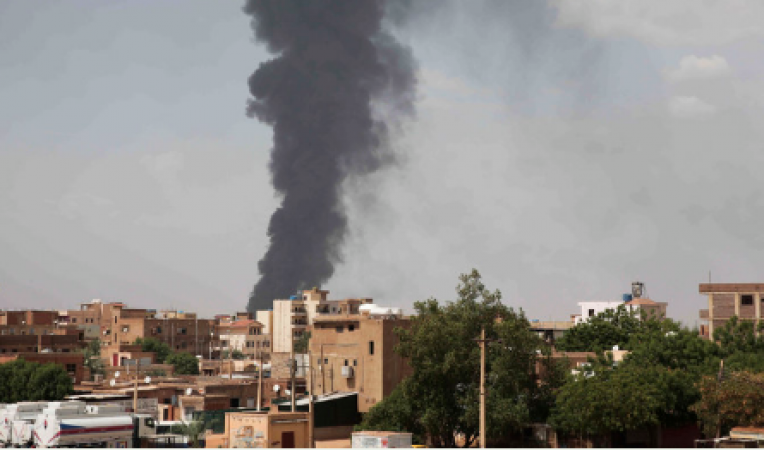
Khartoum: A town on the Blue Nile river in war-torn Sudan has emerged as something of a haven from the fighting, but the survivors there must contend with overcrowding, widespread illness, and encroaching hunger.
Fatima Mohammed, a mother of three, was one of the internally displaced people who arrived in Wad Madani, 200 kilometres southeast of the troubled capital Khartoum.
Then, 10 days ago, she passed away due to illness, leaving behind three kids: Ithar, 11, Dalal, 9, and Ibrahim, 7, who are now largely left to fend for themselves in the school's courtyard.
Also Read: Titanic subwreckage discovered on the ocean floor, but there were no survivors
They are among the hundreds of thousands of people who have fled for their lives since the conflict between two rival generals in the nation of northeastern Africa began in mid-April.
The battle between Gen. Abdel Fattah Al-Burhan's army and the paramilitary Rapid Support Forces, which are led by his former deputy Gen. Mohammed Hamdan Dagalo, has claimed more than 2,000 lives.
In Wad Madani, Al-Jazirah state's cotton-growing region nestled on a bend of the Blue Nile, many people have sought safety in improvised camps set up in classrooms, dorm rooms, and other buildings.
Also Read: Egyptian suspected people-smuggler held in the UK
Soukaina Abdel Rahim, another survivor, currently resides in a room in the girls' dormitory at Al-Jazirah University to the east of Wad Madani with six other members of her family.
"For a family, the accommodations are uncomfortable, there is a lack of space and privacy," she claimed.
Twenty other rooms on the floor, each of which can house an entire family, share the showers and toilets with us.
The area, which is currently sweltering in summer heat and frequent downpours during the rainy season, lacks basic services.
Hanan Adam, who has been displaced along with her husband and their four children, said that there are frequently lengthy water and electricity outages.
All of my kids have malaria, which was a leading cause of death in the nation even before the war, she continued, citing the high temperatures and an abundance of mosquitoes.
However, the fact that someone in Wad Madani was able to today is a small miracle.
Doctors Without Borders has only been able to send one doctor and four nurses to one of the town's camps, which is home to about 2,000 displaced people.
The war has overrun and occasionally targeted humanitarian aid organisations that have long operated in Sudan. While the foreign staff waits for visas, many of their Sudanese employees are worn out or isolated in their homes.
Millions of Sudanese have depended on aid for years, and now the food shortage situation is getting worse and worse.
Mother of five children ranging in age from six months to ten years old Soumaya Omar said, "We have received food parcels, but there is no infant milk in them."
She added that despite Sudan's extreme inflation and severe shortages, "we do not have the means to buy it."
Sometimes neighbours step up and help those in need, as was the case at the Abdallah Moussa school to the west of Wad Madani
Plates were being distributed by a small group of young volunteers to families who were unable to cook because the structure lacked kitchen facilities.
However, in a nation where one in three people experienced hunger even before the war, such initiatives are insufficient.
Malnutrition is starting to affect children, according to a doctor who serves the town's 13 displaced persons camps.
"We are already seeing worrying cases arrive in the clinics of the displaced person camps," he continued.
After being already affected by water scarcity and years of sanctions under former President Omar Bashir, who was overthrown in 2019, Sudan's own ability to produce food has further deteriorated.
Also Read: EU: Ukraine is making reform progress that will open up membership negotiations
The Samil factory in Khartoum, which formerly provided 60 percent of the nutritional requirements for underprivileged children, was one of the many Sudanese structures destroyed in the war, according to UNICEF.
Approximately 620,000 Sudanese children are currently suffering from acute malnutrition, and half of them risk dying if help is not given to them soon, according to the UN agency for children.
However, as fighting rages in numerous hotspots across the nation, UN and non-government aid organisations are strapped for cash and, more importantly, unable to transport the aid supplies they do have.